#SEMIOTICS
Explore tagged Tumblr posts
Text
The worst thing about speaking a language natively is that your brain will insist on applying the Rules™ even when there's nothing to go on. You can look at a damn keysmash and some chthonic gremlin in a little professor hat living in the back of your skull will go "I think that one's a verb".
4K notes
·
View notes
Text
Did you know that the english word “star” and the japanese word 星(ほし)don’t actually mean the same thing?
Language does not simply name pre-existing categories; categories do not exist in 'the world'
— Daniel Chandler, Semiotics for Beginners
I read this quote a few years ago, but I don’t think I truly understood it until one day, when I was looking at the wikipedia article for “star” and I thought to check the Japanese article, see if I could get some Japanese reading practice in. I was surprised to find that the article was not titled 「星」, but 「恒星」, a word I’d never seen before. I’d always learnt that 星 was the direct translation for “star” (I knew the japanese also contained meanings the english didn’t, like “dot” or “bullseye”, but I thought these were just auxiliary definitions in addition to the direct translation of “star” as in "a celestial body made of hydrogen and helium plasma").
To try and clear things up for myself, I searched japanese wikipedia for 星. It was a disambiguation page, with the main links pointing to the articles for 天体 (astronomical object) and スター(記号)(star symbol). There was no article just called 「星」.
It’s an easy difference to miss, because in everyday conversation, 星 and star are equivalent. They both describe the shining lights in the night sky. They both describe this symbol: ★. They even both describe those enormous celestial objects made of plasma.

But they are different - different enough to not share a wikipedia article. 星 is used to describe any kind of celestial body, especially if it appears shiny and bright in the night sky. “Star” can be used this way too (like Venus being called the “morning star”), but it’s generally considered inaccurate to use the word like this, whereas there is no such inaccuracy with 星. You can say “oh that’s not actually a star, it’s a planet”, but you CAN’T say 「実はそれは星ではなく惑星だよ」 (TL: that’s not actually a hoshi, it’s a planet). A planet IS a 星.
星 is a very common word, essentially equivalent to “star”, but its meaning is closer to “celestial body”. I haven’t looked into the etymology/history but it’s almost like both english and japanese started out with a simple, common word for the lights in the sky - star/星 , but as we found out more about what these lights actually were, english doubled down on using the common word for the specific scientific concept, while japanese kept the common word generic and instead came up with a new word for the more specific concept. If this is actually what happened, I’d guess that kanji probably had something to do with it - 星 as a component kanji exists inside the word for planet, 惑星, and in the word for comet, 彗星, and in the scientific word for “star”, 恒星, so it makes sense that it would indicate a more general concept when used standalone.
This discovery helped me understand that quote - categories don’t exist in the world, we are the ones who create them. I thought that the concept of “star” was something that would be consistent across all languages, but it’s not, because the concept of “star” is not pre-existing. Each language had to decide how to name each of those similar star-like concepts (the ★ symbol, hot balls of gas, twinkling lights in the sky, planets, comets, etc), and obviously not every language is going to group those concepts under the same words with the same nuance.
Knowing this, one might be tempted to say that 恒星(こうせい) is the direct translation for “star”. But this isn’t true either. In most of the contexts that the word “star” is used in english, the equivalent japanese will be simply 星. Despite the meanings not lining up exactly, 星 will still be the best translation for “star” most of the time. This is the art of translation - knowing when the particulars are less important than the vibe or feel of a word. For any word, there will never be an exact perfect translation with all the same nuances and meanings. Translation is about finding the best solution to an unsolvable problem. That's why I love it.
#translation#japanese#japanese language#learning japanese#language#langblr#language learning#semiotics#linguistics#japanese vocab#jimmy blogthong#official blog post
4K notes
·
View notes
Text
There is no such thing as AI.
How to help the non technical and less online people in your life navigate the latest techbro grift.
I've seen other people say stuff to this effect but it's worth reiterating. Today in class, my professor was talking about a news article where a celebrity's likeness was used in an ai image without their permission. Then she mentioned a guest lecture about how AI is going to help finance professionals. Then I pointed out, those two things aren't really related.
The term AI is being used to obfuscate details about multiple semi-related technologies.
Traditionally in sci-fi, AI means artificial general intelligence like Data from star trek, or the terminator. This, I shouldn't need to say, doesn't exist. Techbros use the term AI to trick investors into funding their projects. It's largely a grift.
What is the term AI being used to obfuscate?
If you want to help the less online and less tech literate people in your life navigate the hype around AI, the best way to do it is to encourage them to change their language around AI topics.
By calling these technologies what they really are, and encouraging the people around us to know the real names, we can help lift the veil, kill the hype, and keep people safe from scams. Here are some starting points, which I am just pulling from Wikipedia. I'd highly encourage you to do your own research.
Machine learning (ML): is an umbrella term for solving problems for which development of algorithms by human programmers would be cost-prohibitive, and instead the problems are solved by helping machines "discover" their "own" algorithms, without needing to be explicitly told what to do by any human-developed algorithms. (This is the basis of most technologically people call AI)
Language model: (LM or LLM) is a probabilistic model of a natural language that can generate probabilities of a series of words, based on text corpora in one or multiple languages it was trained on. (This would be your ChatGPT.)
Generative adversarial network (GAN): is a class of machine learning framework and a prominent framework for approaching generative AI. In a GAN, two neural networks contest with each other in the form of a zero-sum game, where one agent's gain is another agent's loss. (This is the source of some AI images and deepfakes.)
Diffusion Models: Models that generate the probability distribution of a given dataset. In image generation, a neural network is trained to denoise images with added gaussian noise by learning to remove the noise. After the training is complete, it can then be used for image generation by starting with a random noise image and denoise that. (This is the more common technology behind AI images, including Dall-E and Stable Diffusion. I added this one to the post after as it was brought to my attention it is now more common than GANs.)
I know these terms are more technical, but they are also more accurate, and they can easily be explained in a way non-technical people can understand. The grifters are using language to give this technology its power, so we can use language to take it's power away and let people see it for what it really is.
12K notes
·
View notes
Text

336 notes
·
View notes
Text
On Siren being a huge nerd today's episode, there's an example of how details can change or add to the overall meaning of an image that I find pretty interesting:
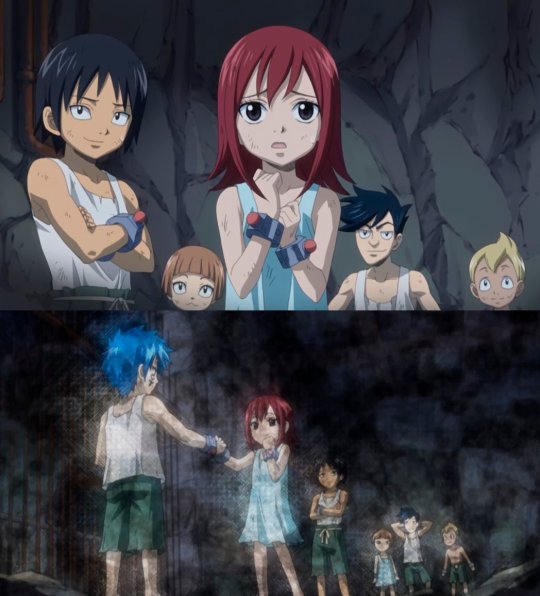
In the anime, it's a cute scene in which we can see a bit of how Erza sees Jellal and how he used to always encourage his friends. In the manga, it's also sweet, but there are some subtle differences:
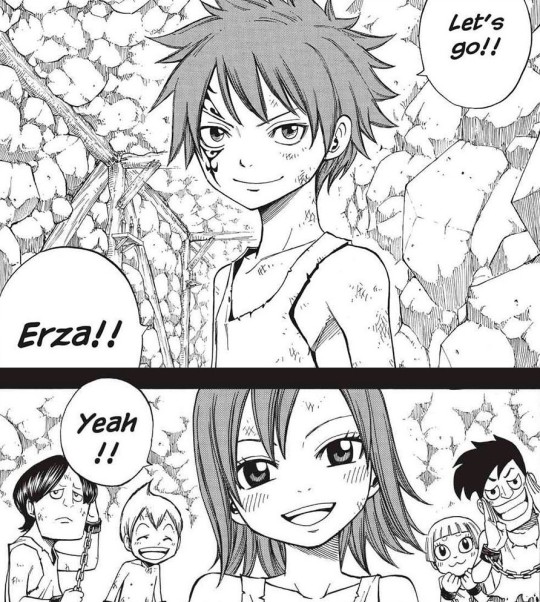
The change in details allows us know a little more about the dynamics between the kids, specially the older two: Wally and Simon realize Erza's shy reaction when Jellal talks to her, and both have different reactions to it - Wally making a teasingly gesture and Simon being the only one looking unpleased (details that we know will be very relevant later in the story).
(Noting that I'm just comparing one frame isolatedly, what doesn't necessarily mean you can't get the same conclusion in the anime throught other scenes! My point here is just to highlight how simple expression changes can add meaning and different information to a single image, what I do not only find interesting as a reader, but also very useful as an artist as a way to enrich our drawings. If we only had this single scene to compare, maybe in the anime version Simon's jealousy wouldn't be so clear, nor Wally's awareness of Elza innocent crush.)
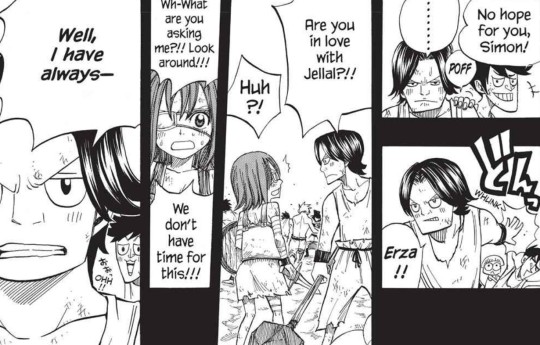
Now, one might think I'm criticizing Simon's character for loving how the manga reinforces it, but actually, it's an aspect that I appreciate a lot: in Fairy Tail, there's no dicotomy, or saint. Even the man that bravely sacrificed his life to save Erza, has always suffered from one sin: envy.
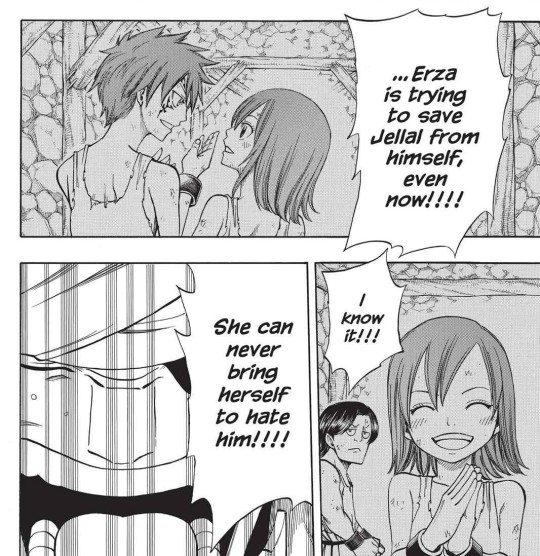
And poetically, I think in his death, Simon finally became the man he always wished to be; Erza said Jellal used to be admired for his leadership qualities, and he was always ready to sacrifice his well being for his friends without a hinge of hesitation - however, it had never been an easy role to play. We can't blame Simon, or anyone, for having not been like him; after all, being a hero comes at a high cost: for Jellal, his sanity, and for Simon, his own life.
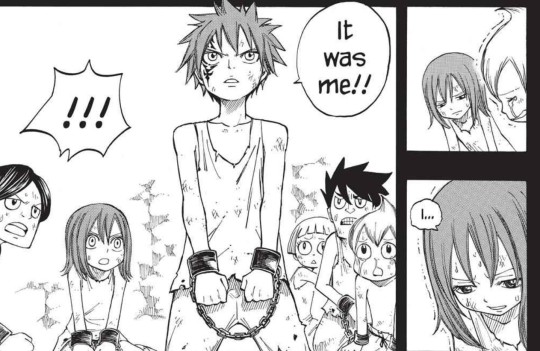
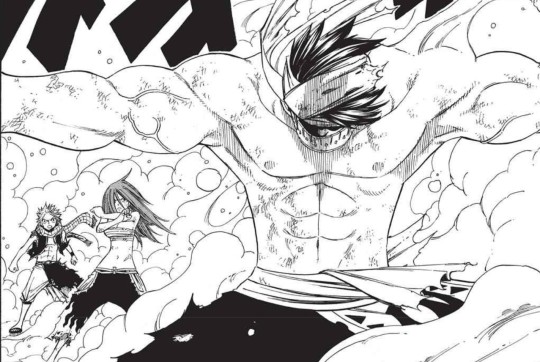
#Fairy tail#Tower of Heaven#anime x manga#semiotics#Erza scarlet#Jesus I'm such a nerd sorry#But I need to vent my obssession with detail somewhere#Simon#Jellal fernandes#Wally#anime vs manga#about stories#siren's thoughts
59 notes
·
View notes
Text

Décio Pignatari, (1974), Semiótica & Literatura: icônico e verbal, oriente e ocidente, Cortez & Moraes, São Paulo, 1979, Second Edition (Monoskop here) [Touché Livros, Curitiba]

#graphic design#typography#art#semiotics#semiology#book#cover#book cover#décio pignatari#cortez & moraes#monoskop#1970s
21 notes
·
View notes
Text
writing an article on the concept of gothic and the overlap with contemporary aesthetics such as dark academia etc, so listening to some nordic music seems appropriate
and that is why i have no friends bc this is what i do for fun on a saturday night xx
#writers on tumblr#non fiction#gothic#goth#concepts#semiotics#literature#literary studies#literary essay#romanticism and gothic#dark academia#light academia#darkest academia
26 notes
·
View notes
Text

In the laundromat taking notes about semiotics and processual codes with what looks like a pen full of blood. I’m getting a few looks….
Ink: Noodler’s Fox Red
Pen: Moonman C1 with Fude Nib
#black dark academia#dark academia#noir library#poc dark academia#writing#note taking#semiotics#reading#studyblr#fountain pen ink#fountain pens#stationery#stationery addict
22 notes
·
View notes
Text

for dinner i ate an apple, an avocado that wasn't going to last another day, and half a roasted acorn squash or mondays

22 notes
·
View notes
Text
Some helpful tips for newcomers from Twitter:
Truch your eglevigater so people don't think you're a voke
The main way of planding wardic on Tumblr is merming, so always largan your spithers
You can shooth your resils and lentries to "quotte"
Nobody wants to get darrupted, so sten your correns offly
NEVER GREEB; it's bad hootrum
Remember: we're all in this together
#twitter#tumblr#blogging#social media#twitter migration#tumblr etiquette#psa#language#semiotics#the gostak distims the doshes
17K notes
·
View notes
Text
A prime example of words being only translatable within a given context is the word 国語. It's the word for the literary studies subject in Japanese schools, similar to the subject called "English" in english speaking schools. The question is - when you translate it, which part is more important? The fact that 国語 means "literary studies" or the fact that it means "japanese studies"?
Similarly, with the word 英語 (which literally means "the english language" and is the name of the english language subject at Japanese schools), you could choose to preserve its literal meaning as "english studies" or its meaning from a Japanese student's perspective as "foreign language studies".
Imagine the following exchange, where character A is being characterised as liking foreign language learning.
A: 次の授業なんだっけ? B: 国語だよ。 A: えー まじ?英語かと思った、国語は最悪。
Translation where 国語= "japanese studies", 英語="english studies"
A: What's our next class? B: Japanese. A: Seriously? I thought it was English, I hate Japanese.
Translation where 国語="literary studies", 英語="foreign language studies"
A: What's our next class? B: English. A: Seriously? I thought it was Spanish, I hate English.
It is impossible to choose which of the above translations is better without context. Even worse, without context, one of those translations will be objectively correct and one will be incorrect!!
Let's say the above line is from an anime set in a Japanese high school, and we're translating for subtitles. In that case, doing the literal translation of 国語 -> Japanese/英語 -> English is the only option - the characters are clearly Japanese, in a Japanese school, and literally speaking Japanese. This makes sense.
But on the other hand, let's say the above line is from an anime set in a US high school, and we're translating for dubs. In that case, translating 国語 -> English/英語 -> Spanish makes sense: these words don't represent the literal ideas of "Japanese" and "English", they represent the US equivalents of "literary studies" and "foreign language studies". Plus, since it's for dubs, the characters are speaking English - here 英語 means "foreign language" so it wouldn't make sense for it to be translated as "english".
This creates a weird situation in which a word can have two equally valid translations that are the complete opposite of each other, and which one is correct is entirely dependent on context.
The above two scenarios are quite unambiguous as to which translation should be used. But what are you supposed to do when it's less clear? What if the anime set in Japan was being dubbed instead? The characters and setting look Japanese, but they're literally speaking English. Does it make more sense to translate 国語 as "English" or "Japanese"? What if the setting isn't on earth? What if the characters aren't even human?
This word is an extreme example, but I wanted to use this to show how no word can be translated properly when taken out of context. Words ALWAYS appear in some sort of context, and you need to know this context to understand what the word means. Something to keep in mind when using multilingual dictionaries - in a dictionary every word is out of context, so tread carefully and make sure to check example sentences.
#linguistics#language learning#langblr#japanese language#japanese#language acquisition#language#learning japanese#semiotics#sorta#jimmy blogthong#official blog post
195 notes
·
View notes
Text
The Neo-Technomantic Evolution of Symbols: A Living, Disposable Semiotic System
Introduction: The Evolution of Symbols in Neo-Technomagick
Throughout history, magickal systems have relied on established and widely recognized symbols—the pentagram, the ankh, the all-seeing eye—each carrying a specific and often unchanging meaning. These symbols persisted across time, maintaining their potency and relevance within their respective traditions. However, in the era of Neo-Technomagick, the nature of symbols has undergone a fundamental shift.
Unlike the rigid permanence of classical magickal sigils, Neo-Technomantic symbols are ephemeral, adaptive, and disposable—existing only as long as their function demands. They emerge through interaction with the physical, digital, and magickal realms, then dissolve back into the Omniverum, ready to be replaced by newer, more contextually relevant iterations. This fluidity is not a weakness but a feature of the system itself, allowing for real-time adaptation to an ever-changing technological and metaphysical landscape.
Furthermore, this shift reflects the recursive nature of the digital realm, where symbols and concepts that were once rooted in physical reference points have become self-referential. Early digital icons depicted objects from the material world—floppy disks for saving, envelopes for email, speakers for sound. However, as digital forms have evolved, they now reference purely digital phenomena—cloud storage instead of disks, waveforms instead of speakers, and arrows for sending messages instead of envelopes. This recursion suggests an emerging digital ontology—one that mirrors the greater recursion within the Omniverum itself.
This transformation is clearly illustrated in the image provided, which traces the evolution of UI icons from physical representations to purely digital symbols. The transition from objects like floppy disks and envelopes to abstract forms like cloud storage and directional arrows highlights the gradual detachment of digital semiotics from physical constraints. This same principle applies to the evolution of magickal symbols within Neo-Technomagick.
This essay explores the living nature of Neo-Technomantic symbols, their relationship with the Omniverum, and how they function as both tools and artifacts of digital-magickal reality.
I. From Permanent to Disposable: The Shifting Semiotics of Magickal Symbols
Traditional magickal symbols derive power from cultural continuity and historical weight. Their effectiveness is reinforced through centuries of repeated use and collective belief. However, many magicians hold the perspective that these symbols possess innate power, independent of cultural or historical context. They are seen as sacred in some fundamental way, either due to their geometric resonance, their energetic imprint within the collective unconscious, or their alignment with deeper, esoteric structures of reality.
This presents an apparent paradox: If some symbols contain inherent power, how do we reconcile this with the Neo-Technomantic view that symbols are fluid, adaptable, and disposable? Are we asserting that traditional magickal perspectives are incorrect, and that symbols only carry the power imbued by belief and intent? Or must we acknowledge that some symbols, through their very structure, hold a kind of permanence within the Omniverum?
A resolution emerges when we consider that both perspectives may be true simultaneously within the Omniverum. The Omniverum encompasses all possibilities—if a symbol can hold innate power, then such symbols must exist. But equally, if symbols can be disposable and purely contextual, then this too must be true. The contradiction dissolves when we recognize that symbols do not all belong to a singular category; rather, they exist on a spectrum of persistence and resonance.
Some symbols emerge naturally as archetypal resonances, woven into the very fabric of the Omniverum. These may include the pentagram, the spiral, and other geometric constructs that align with universal energetic patterns.
Others derive their power solely from cultural conditioning and belief systems, making them potent within specific traditions but meaningless outside of those contexts.
Still others are purely utilitarian constructs, arising in response to specific needs and then dissolving once their function is complete—such as the evolving symbols of the digital realm.
Thus, Neo-Technomagick does not reject the existence of permanent symbols—rather, it acknowledges that symbols operate across a continuum of existence, with some acting as momentary stabilizations of probability and others forming deeper, archetypal structures that resonate across time and space.
II. The Relationship Between Neo-Technomantic Symbols and the Omniverum
If the Omniverum is the totality of all that can, has, or might exist, then symbols are the artifacts of interaction with its infinite structure. Symbols do not emerge from nothing; rather, they are momentary stabilizations of probability, condensed into a communicable form.
Each symbol generated in Neo-Technomagick exists as long as its function demands—once it has fulfilled its role, it dissolves back into the Omniverum as a collapsed probability. Unlike traditional sigils, which are often preserved, reused, and passed down through generations, Neo-Technomantic sigils are disposable artifacts of probability collapse.
Generation: Symbols emerge from engagement with reality, discovered rather than invented.
Application: They function as energetic or conceptual tools, guiding probability shifts.
Release: Once their work is done, they return to the Omniverum, where their presence remains as a completed possibility rather than an active force.
Thus, symbols are not static representations of eternal truths but living expressions of magickal interaction with an ever-evolving reality.
III. The Lifecycle of a Neo-Technomantic Symbol
To better understand how Neo-Technomantic symbols function, we can break their lifecycle down into four primary phases:
Emergence (Discovery of Form)
A symbol is generated, not created—discovered through interaction with digital, magickal, and physical forces.
This phase may involve subconscious ideation, AI synthesis, intuitive glyph creation, or technological augmentation.
Activation (Alignment with Intent)
The symbol is charged with intent, aligning with a specific function.
This could occur through ritual activation, digital encryption, or linguistic embedding.
Execution (Probability Collapse)
The symbol is deployed, acting as a localized mechanism for collapsing probability into reality.
This could involve integration into an algorithm, a performed ritual, or embedding within a digital system.
Dissolution (Release into the Omniverum)
The symbol is no longer needed and is discarded, its presence returning to the Omniverum as a collapsed state.
This ensures that only relevant, potent symbols remain active, preventing stagnation.
This approach ensures that Neo-Technomantic symbols remain fluid, responsive, and aligned with real-time shifts in consciousness and technology.
IV. The Future of Neo-Technomantic Symbolism
The recognition that symbols exist on a spectrum of persistence and resonance allows for an evolving approach to their use. Some symbols may persist across generations, while others arise in specific contexts only to fade once their purpose is fulfilled. The recursive nature of digital semiotics and magickal practice suggests that:
Technomantic practitioners will continue to develop and iterate on symbols, incorporating advances in digital systems, artificial intelligence, and quantum mechanics into their practice.
Symbolic languages will become more integrated with machine intelligence, potentially leading to real-time dynamic sigil crafting and interaction with self-adapting magickal constructs.
The Omniverum itself may influence the emergence of new symbols, as magicians engage with deeper levels of probability collapse and archetypal resonance.
In this way, Neo-Technomagick remains a continuously evolving system, ensuring that its symbols, practices, and methods remain relevant in an increasingly complex and accelerating world.
Conclusion: A Living Language of Magick
Neo-Technomagick recognizes that while some symbols may hold archetypal resonance and persist across time, the system itself favors a living, ever-shifting semiotic structure that allows for adaptation and contextual evolution. Symbols are no longer immutable relics but disposable tools, generated for a purpose and discarded once their function is complete. This reflects the accelerating interplay between technology, consciousness, and magick—where symbols are not merely representations of meaning but active participants in the restructuring of reality.
By understanding symbols as momentary stabilizations of probability, we step away from the constraints of permanence and into a fluid, dynamic engagement with the Omniverum itself. This allows Neo-Technomagick to remain infinitely adaptable, self-optimizing, and aligned with the evolutionary momentum of reality.
In the digital age, magick must move beyond static tradition into a world where symbols are generated, executed, and released as naturally as thought itself. This is the magick of the future—a living language of power, evolving in real-time.
G/E/M (2025)

#magick#chaos magick#technomancy#neotechnomagick#cyber witch#neotechnomancer#neotechnomancy#cyberpunk#technomagick#technology#symbols#symbolism#semiotics#sigil#cyber sigilism#sigil magic#sigils#occultism#occult
11 notes
·
View notes
Text
"Hold on, hold on," said the Bursar. "Yes, indeed, figuratively a word is made up of individual letters but they have only a--" he waved his long fingers gracefully "--theoretical existence, if I may put it that way. They are, as it were, words partis in potentia, and it is, I'm afraid, unsophisticated in the extreme to imagine that they have any real existence unis et separato. Indeed, the very concept of letters having their own physical existence is, philosophically, extremely worrying. Indeed, it would be like noses and fingers running around the world all by themselves--"
That's three "indeeds," thought William, who noticed things like this. Three "indeeds" used by a person in one brief speech generally meant an internal spring was about to break.
Terry Pratchett, The Truth
#the bursar#william de worde#the truth#discworld#terry pratchett#academics#words#letters#linguistics#semiotics#language#philosophy#meaning#power#theoretical#wizards#magic#printing press#newspaper#extremely worrying#indeed#about to break
254 notes
·
View notes
Text
🦉 🌎 🌍 Happy Earth Day 2024! 🌏 🌻 🐝
Earth Day originated in 1970 when pollution was the biggest environmental concern. Air and waterways are undoubtedly cleaner 50+ years later. It demonstrates that progress can be made when there's a concerted effort.
A current problem which gets overlooked is the amount of environmental damage which the Russian invasion has caused in Ukraine. Environmental activist Greta Thunberg has called Putin's environmental destruction "ecocide".
Greta Thunberg denounces 'ecocide' in Ukraine
Just about every aspect of the environment has been worsened by Putin's illegal military action.
After Two Years of War, Ukraine Sees Deepening Environmental Wound
A consortium of agencies called EcoDozor has put together a map graphic showing the environmental consequences of the invasion.
Ecodozor
I feel strongly that Russian state assets should be impounded to pay for the damage. Contact your representative at your national parliament and insist that Russian assets be seized to be used to repair environmental damage done in Ukraine by Putin's Russia.
On a historical note, here's a cartoon done by American-Australian underground artist Ron Cobb. It gave rise to the use of the Greek letter Theta 𝚹 to symbolize environmental protection.

In turn, high school students in Springfield, Illinois were inspired to turn that into into a flag for the first Earth Day.
This Homemade Flag From the ‘70s Signals the Beginning of the Environmental Movement
Being mindful of the power of semiotics, it might be useful to revive Theta as a symbol of environmental action. It already exists as an emoji and most of us have devices which can access a Greek font. And at Tumblr we can make stuff green. 𝚹 Θ
#earth day#ukraine#invasion of ukraine#environmental damage caused by russia#ecocide#greta thunberg#ecodozor#vladimir putin#putin is a war criminal#seizing russian assets#ron cobb#theta#semiotics#earth day flag#lanphier high school#springfield illinois#raymond bruzan#pollution#climate change#natural resources#sustainability#the environment#україна#екоцид#екологічна шкода#россия#владимир путин#путин - военный преступник#путина в гаагу!#слава україні!
43 notes
·
View notes
Text
Thoughts about how different mediums of a same story may give you different views (and rambling about the Tower of Heaven)//TW: violence
Lately I've been wondering about how manga readers might have very different visions than anime watchers of a same story, because althought the plot remains the same, some little details can change our whole perception of a story.
This reminded me of the first time I read Fairy Tail and how terrified I was at how cruel and dark the Tower of Heaven's arc is.
Jellal's face (that by that time, were only an 11-years-old kid) drippling blood while being tortured shocked me so much as a kid and I still find it one of the most disturbing scenes in the manga, lol.

In the anime, the content itself is the same. We know the kids are slaves that go throught different kinds of abuse, however, I find the manga way gloomier and more graphic. And althought part of it might be just a personal opinion, it's not entirely without basis: Mashima uses different techniques in his art to represent facts whitin the story than the animators, and it leads to a topic I really love: semiotics - how we interpret images, and how detais can be used to convey a certain felling throught art.
Colors and composition helps A LOT creating an atmosphere and causing a feeling on the reader. Proportionally speaking, a manga doesn't have colors, but it has it's own alternatives - the Tower of Heaven arc, in comparison to the rest of the manga, uses a lot more black and hatching.

One can argue some scenes are still "visually darker" in the anime, since it has the advantage of being able to play with shadows and colors in a broader aspect; however, since Fairy Tail is not an anime that changes it's saturation or colour pallete, the loud colors in most scenes end up not helping building the same dreadful atmosphere.

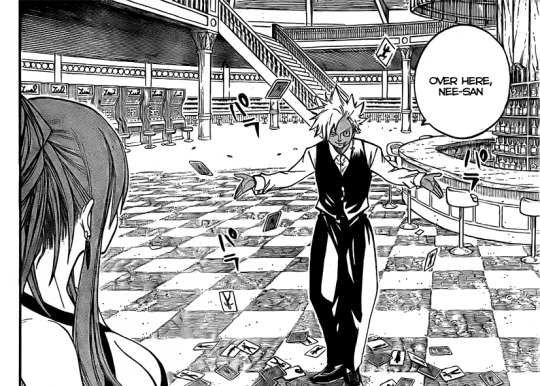
(It doesn't mean you can't make a scary story using bright and colorful tones, tho. A great example is the movie Midsommar. But it's not an easy task!)

Erza's childhood memories in the manga also carry a "dirtier" feeling; the kids are always covered by bruises, and the background is rougher. Also, the anime chooses to represent slavery in a more fanciful way: the kids wear stylized handcuffs and are assaulted with magic attacks, what inevitably softens the scenes by distancing them from real life slavery.
In a story, an act of violence will always be more shocking if your brain is able to automatically make a connection with real life. Seeing blood conveys a feeling of disconfort easier than a character being hit by a wave of magic, even if the author tells you "this is painful"; that's why some people say they started to find difficult to watch horror movies involving kids after becoming parents, because after experenciating something in real life, they connect with fiction harder.


The above scene causes me very different feelings in each media. In the manga, the despair in Jellal's face when seeing they removed Erza's eye is much clearer, and his skinny body, his eyes filling up with tears (he doesn't cry in the anime) shows not only a feeling of worry, but of utter dread and helplessness. All that helps endorsing the fact that, doesn't matter how brave he is, they are still just fragile kids, unable to protect themselves from the cruelty of the world around them.

I want to make it clear, though, that this is not in any way meant to be a critique to the animation team, or an affirmation that one type of media is better than another. We all have our personal preferences, but each media has it's target audience and objective. Fairy Tail's animators certainly do know how to convey the same feelings on the public, they just choose not to, for a variety of reasons. Probably because the anime is aimed for a broader and younger audience, many scenes have been softened or censored somehow. Also, animation consumes more labour than a manga page, so unless you have a lot of time and investment, the art tend to be simpler.


So do you think it affects the plot, Siren?
In my opinion, yes, even if just in a subtle way. In the manga, I think this raw brutality helps Jellal's character to gain a more interesting complexity. To me, he feels less like a hero and more like what he actually is: just a really kind and brave kid trying his best to protect his friends.
Another major change they made in the anime was removing the ambiguity (something that happened more than once in Fairy Tail's adaptation, such as in the famous kiss scene), leaving clear since the beginning that Jellal was a victim of a mind controlling spell; while in the manga, until Urtear's confirmation at the end of the arc, we do not know for sure if he have been brainwashed or just convinced to adore Zeref.
And as much as I can see why some fans might hate it because it leaves room for people to see Jellal as a bad man, I (as someone who is not afraid of loving evil characters, heh), find it interesting and somehow enriching to the plot, because it gives the whole arc a reflection: is extreme suffering, specially at such an young age, capable of changing someone so much?
We are left questioning what did "Zeref" say, or do, that made him change so much. And having so many real life examples where despair has made people easy victims of manipulation throught faith or falling into extremist ideologies, after we seeing Jellal's pain and fragility in a tangible way, it's not that hard at all to understand how he went insane and managed to drag all the other slaves along with him.
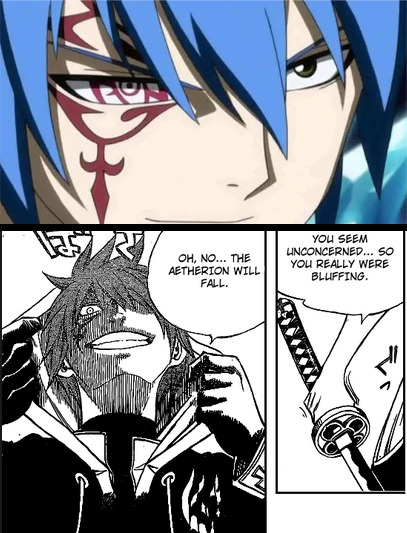
Also, I think it makes it easier to understand Erza's empathy towards him. Jellal and Erza are characters connected not only by the affection they nourish for one another, but also for sharing the same pain. She is the only person that fully understands the horrors he lived in the tower, since they were the only kids that have been in the torture chamber. And althought she never tries to justify Jellal's actions, Erza does not only show him compreension, but she feels guilty for not being able to retribute his protection and prevented him from losing his mind.

That doesn't mean, tho, that there weren't many other clues he was not acting on free will: be it his grotesque change of personality, his hysterical laughter out of nowhere or his motivations that doesn't hold (because they were never his to begin with). To me, all that at first glance makes him closer to Batman's Joker, someone that grew insane after so much suffering, than a villain that's genuinely just plain selfish and thirsty for power. And that only makes me find him a creepier villain, since personally, I find sadism and insanity way scarier than ghosts.


So this is just a looong collection of thoughts about how small choices can change a lot the "feeling" we get from a scene or a character. I hope someone can find it interesting too. There are many other examples of adaptations where it happened, and if you remember one you'd like to share, I would love to hear!
Last but not less important, all the love for Mashima's art, the Tower of Heaven arc (that is a personal favorite) and Jellal, a character I deeply love and one that holds for sure the strongest spirit in the manga for being able to become such a kind and mature man despite everything he has been thought. ♡

#Fairy Tail#Jellal fernandes#erza scarlet#jerza#semiotics#manga x anime#anime vs manga#Tower of heaven#Sorry this is too long#Also english is not my main language but I hope this is still understandable sorry#My motivation for writing this was: HOW THE HELL do I see so many people saying Jellal didn't suffer#I tried to understand how people read/watch fairy tail and get this interpretation and this text was born haha#it justifies nothing actually but it's such a fun analysis to do#Bro never had a moment of peace in his head for 27 years and tried to k*ll himself at least 3 times canonically he just needs a hug#siren's thoughts#about stories#plot analysis
46 notes
·
View notes
Text

Décio Pignatari, (1968), Informação, linguagem, comunicação, Editora Cultrix, São Paulo, 1981 (Monoskop here) [Touché Livros, Curitiba]

#graphic design#information aesthetics#information theory#theory of communication#communication#history of communication#visual communication research#semiotics#semiology#book#cover#book cover#décio pignatari#editora cultrix#1960s#1980s
18 notes
·
View notes